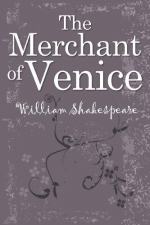|
This section contains 23,299 words (approx. 78 pages at 300 words per page) |

|
SOURCE: “Allegorical Commentary in The Merchant of Venice,” in Shakespeare Studies, Vol. XXIV, 1996, pp. 156-210.
In the essay below, Rosenheim argues that the themes of power, fatherhood, and blindness are developed through allegory in The Merchant of Venice. These themes are principally presented through the parable of the Prodigal Son as it applies to Launcelot versus his father, Old Gobbo, and, by extension, to the “father” Shylock versus the “son” Antonio.
In Asserting the prevalence of “symmetry” or moral equivalence between Shylock and Antonio, René Girard is adding his voice to an enduring current in the criticism of The Merchant of Venice. It is much the same opinion that Hazlitt advances in suggesting that Shylock's “Jewish revenge is at least as good as Christian injuries;” that A. D. Moody holds in finding that Merchant is “about the essential likeness of Shylock and his judges”; or Harold Goddard in...
|
This section contains 23,299 words (approx. 78 pages at 300 words per page) |

|


